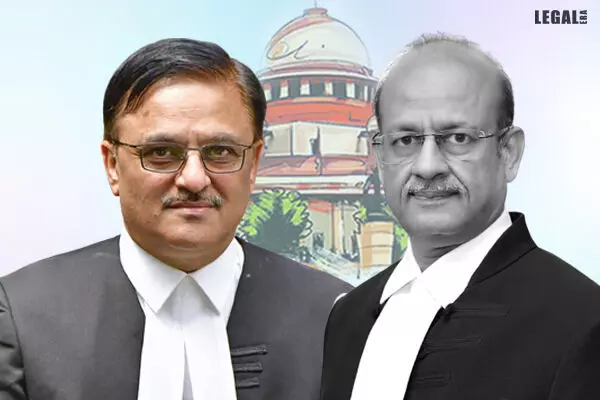- Home
- News
- Articles+
- Aerospace
- Agriculture
- Alternate Dispute Resolution
- Banking and Finance
- Bankruptcy
- Book Review
- Bribery & Corruption
- Commercial Litigation
- Competition Law
- Conference Reports
- Consumer Products
- Contract
- Corporate Governance
- Corporate Law
- Covid-19
- Cryptocurrency
- Cybersecurity
- Data Protection
- Defence
- Digital Economy
- E-commerce
- Employment Law
- Energy and Natural Resources
- Entertainment and Sports Law
- Environmental Law
- FDI
- Food and Beverage
- Health Care
- IBC Diaries
- Insurance Law
- Intellectual Property
- International Law
- Know the Law
- Labour Laws
- Litigation
- Litigation Funding
- Manufacturing
- Mergers & Acquisitions
- NFTs
- Privacy
- Private Equity
- Project Finance
- Real Estate
- Risk and Compliance
- Technology Media and Telecom
- Tributes
- Zoom In
- Take On Board
- In Focus
- Law & Policy and Regulation
- IP & Tech Era
- Viewpoint
- Arbitration & Mediation
- Tax
- Student Corner
- AI
- ESG
- Gaming
- Inclusion & Diversity
- Law Firms
- In-House
- Rankings
- E-Magazine
- Legal Era TV
- Events
- News
- Articles
- Aerospace
- Agriculture
- Alternate Dispute Resolution
- Banking and Finance
- Bankruptcy
- Book Review
- Bribery & Corruption
- Commercial Litigation
- Competition Law
- Conference Reports
- Consumer Products
- Contract
- Corporate Governance
- Corporate Law
- Covid-19
- Cryptocurrency
- Cybersecurity
- Data Protection
- Defence
- Digital Economy
- E-commerce
- Employment Law
- Energy and Natural Resources
- Entertainment and Sports Law
- Environmental Law
- FDI
- Food and Beverage
- Health Care
- IBC Diaries
- Insurance Law
- Intellectual Property
- International Law
- Know the Law
- Labour Laws
- Litigation
- Litigation Funding
- Manufacturing
- Mergers & Acquisitions
- NFTs
- Privacy
- Private Equity
- Project Finance
- Real Estate
- Risk and Compliance
- Technology Media and Telecom
- Tributes
- Zoom In
- Take On Board
- In Focus
- Law & Policy and Regulation
- IP & Tech Era
- Viewpoint
- Arbitration & Mediation
- Tax
- Student Corner
- AI
- ESG
- Gaming
- Inclusion & Diversity
- Law Firms
- In-House
- Rankings
- E-Magazine
- Legal Era TV
- Events
Supreme Court: Condition of Right to Repurchase Will Not Be Personal to the Vendor Unless Specifically Stated in the Documents

Supreme Court: Condition of Right to Repurchase Will Not Be Personal to the Vendor Unless Specifically Stated in the Documents
The Supreme Court has ruled that the condition of right to repurchase in sale deed will not be personal to the vendor unless the terms in the documents specifically state so.
The division judges bench comprising of Justices Abhay S. Oka and Rajesh Bindal observed that, such a right can always be assigned and the contract containing such condition shall be enforceable. The only exception being that such a right should not be personal in nature.
The judgment came in the case of Indira Devi vs. Veena Gupta & Ors. wherein the appellant challenged an order passed by the High Court of Judicature at Patna in Second Appeal.
The case revolved around a conditional sale deed executed by late Kishori Lal Sahu and his son in favor of Indira Devi (Appellant/Vendee) in 1977. The sale deed stipulated that if the vendors were unable to return the full consideration amount by July 1984, the vendee would become the exclusive owner of the property.
However, late Kishori Lal Sahu subsequently executed a gift deed in 1983, transferring the property to his daughter-in-law, Veena Gupta (Respondent/Vendor), with the provision that she could repurchase the property from Indira Devi.
The dispute arose when the vendors attempted to return the consideration amount to Indira Devi, but she refused to accept it. In response, Veena Gupta filed a civil suit seeking specific performance of the sale deed or, alternatively, eviction of the vendors on the grounds of personal necessity and non-payment of rent.
The Trial Court and the Lower Appellate Court dismissed the suit, but the High Court reversed the judgments of the Lower Courts and ruled in favor of the respondents. The High Court held that the right to repurchase the property was assignable and had been validly assigned by late Kishori Lal Sahu to Veena Gupta through the gift deed.
The Supreme Court, in its judgment, analyzed the provisions and clauses of the sale deed and the gift deed.
The Court noted that, the sale deed contained a specific condition allowing the vendors to repurchase the property by returning the consideration amount within the stipulated time.
The Court further observed that the gift deed expressly mentioned that Veena Gupta could take possession of the property sold to Indira Devi by purchasing it back.
The Court referred to previous judgments and relied on the principles established therein to support its verdict. It emphasized that in this case, the assignment was within the family and not to a third party, as it was executed by the father-in-law in favor of his daughter-in-law.
The Court avowed that, “The assignment of obligations in a document is not possible without the consent of the other party. No implied prohibition of transfer or assignment can be inferred in a document. The benefit of contract is assignable in cases where it does not make any difference to the person on whom the obligations lies, to which of two persons he is to discharge.”
Accordingly, while noting that in the instant case, there was no term in the conditional Sale Deed which debarred its assignment to any other person, thus, the bench dismissed the appeal upholding the High Court judgment.



